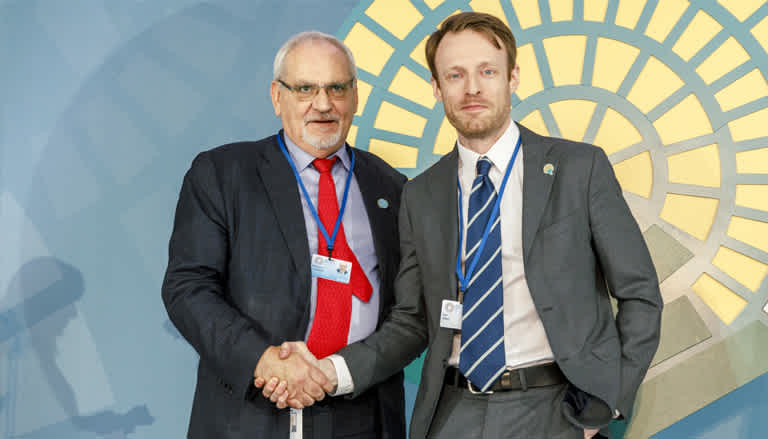Impact blog
Impact blog: Principles are the friend of profit

Philippe Le Houérou, the CEO of IFC, and Paul Hailey, Head of Impact at responsAbility, shake hands at the signing ceremony to launch the IFC Operating Principles for Impact Investment Management. Photo © Dominic Chavez/International Finance Corporation
Impact investing is an innovative and dynamic industry that has fundamentally changed the conversation for many investors. However, 14 years after the UN described 2005 as the year of microfinance, and 12 years after the term “impact investing” was coined, it is fair to say that the industry is past the “move fast and break things” phase. Impact investing is a USD 500 billion industry, as the GIIN recently pointed out. Therefore, establishing a framework that seeks to set out what is, and what isn’t, impact investing, is a critical step if we are to avoid many of the mistakes made by “conventional” finance.
Taking a step in the right direction then, in a ceremony at World Bank headquarters in Washington DC, 60 investors with USD 350 billion of impact investing assets, including responsAbility, recently signed the IFC Operating Principles for Impact Investment Management. The Principles are meant to define impact investing, setting out a framework for how impact should be examined, measured and integrated into portfolio strategy.
“It is fair to say that the industry is past the 'move fast and break things' phase.”
Paul Hailey, Head of Impact
In part, the Principles have been prompted by concerns of “impact-washing” by some newer actors in the space. Of course, many mainstream investors have entered the impact investing industry with the best of intentions, and indeed there are major banks with a long-standing presence in impact investing. However, any growing industry can attract actors that aren’t willing to play by the rules, from gold rushes in the Wild West to Big Tech. Currently 40% of impact investing assets are with investors that have a mix of conventional and impact assets, pressing investors to ask – are my investments really impact investments?
Several efforts have already been made to promote the ideals of sustainable investing (notably the Principles for Responsible Investment, or PRI). Equally, there is a proliferation of initiatives in place to define the metrics that should be used when measuring impact, each with their own acronym and adherents. This variety is in part due to the astonishing number of options open to investors in this space – for example, my own company, responsAbility, invests in microfinance institutions, fintech, agricultural cooperatives, warehouse providers, hydro plants, and solar lantern companies, to name a few. These in turn are spread across more than ninety developing countries, whose contexts and market dynamics often vary wildly.
“Any growing industry can attract actors that aren’t willing to play by the rules…pressing investors to ask – are my investments really impact investments?”
Paul Hailey, Head of Impact
The IFC Principles mark a shift in that they address how impact management should be conducted – in other words they bridge the gap between philosophy of impact investing and the nuts and bolts of which metric to use. In doing so, they respond to growing interest in impact, and the desire for a credible, harmonised standard for impact investing. More specifically, people want to see that when you go into an investment, you have an expectation of the impact you will have (“intentionality”). They want to know that you are monitoring your impact (as shown in responsAbility’s Impact report). They want to know how you expect your impact to endure after you exit. And they want to see that this impact will be independently verified. All of these are core components of the IFC Principles, as well as topics that responsAbility and other industry leaders have addressed since inception.
Of course, the variety of ways in which impact investing can contribute positively means that any setup must be flexible enough to prevent harm and allow good. In this regard, the Principles also ensure a certain rigour of approach, without trying to define every detail. In any case, the IFC Principles are unlikely to be the last word in defining what impact is – like conventional finance, good standards should ensure that fundamental, timeless values are applied to markets that are constantly evolving.
But they do mark an important step forward in defining how impact investors should operate. Twelve years after the start of the financial crisis, we can all remember what happens when the financial sector does not insist on a basic set of standards and values. Ensuring confidence in an industry that benefits hundreds of millions of the world’s most vulnerable people could be the most valuable performance target of all.

Paul Hailey
Paul Hailey is Head of Sustainability and Impact at responsAbility Investments and the author of various publications and articles. Previous roles at the company include Senior Research Analyst for the financial sector. He has an MBA from École des Hautes Études Commerciales de Paris (HEC Paris), where he is also a lecturer, and a B.A. (Hons) from Pembroke College, University of Cambridge.